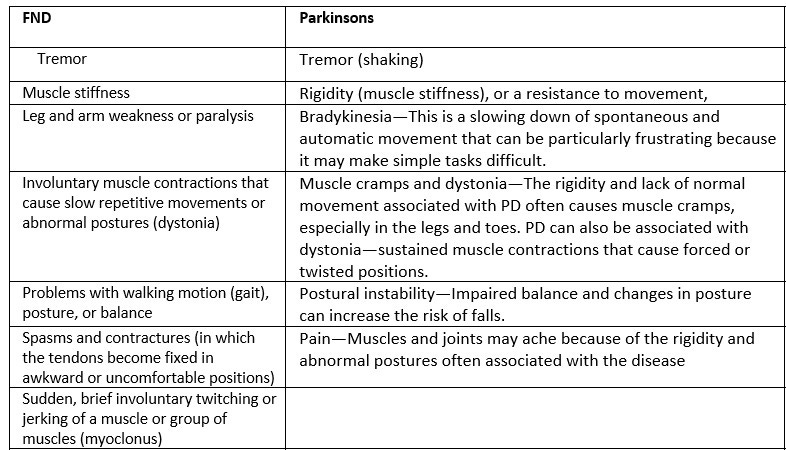What is a diagnosis?
A diagnosis is a cluster analysis of symptoms, where history has shown that some symptoms often are grouped together. In more recent times, most diagnoses are split into new groups of sub-diagnoses, such as tremor-dominant or rigidity-dominant Parkinson’s. The reason is that most people do not fit 100% into the existing groups of diagnosis. In other words, most people have their individual set of symptoms, which often don’t group neatly into a standard diagnosis.
We compare two diagnoses.
The well-known diagnosis of Parkinson’s and the rarer diagnosis of Functional movement disorder (FND)
The symptoms FND and Parkinson’s have in common is:
While Parkinson’s is considered incurable, it is well known that FND is curable via handling mental distress and trauma and can be short lived. Symptoms are similar to Parkinson’s, but FND is treatable and you can heal completely. Only one main symptom is the difference between these, and I do not think it is a must that you must have all.
I find it interesting that the symptoms of FND are treatable with therapy and doctors accept that. But doctors do not accept that Parkinson’s is treatable by addressing drama in your life, bad self-esteem, or a huge workload.
What is the difference between FND and Parkinsons?
My best guess is that the clients that got this FND diagnosis can address the 1:1 relationship between symptoms and stressors.
For example:
I got this tremor because I come from a family where there is so much drama all the time;
I got an anxiety attack;
I got this tremor after my wife died;
I always tremor, when I am presenting for a group at my job.
So at the time when you visit your family doctor and confront him/her with your symptoms:
if you told the doctor about things like the above and you were crying or agitated during the appointment, and you had a smart doctor he/she might make the connection to FND or PTSD and send you in another direction (psychology);
if you said nothing about the stressors (doctors usually do not proactively ask about your life or family histories), and he just looked at your physical symptoms he sent you to a neurologist who is trained to spot Parkinson’s.
This is my hypothesis after I found the FND diagnosis, which I think is a lot less well-known, but interesting in its nearly 100% overlap with Parkinson’s symptoms.
I have personal experience with how this can work. When I was young 22 years, I got a terrible pain in my forehead and a small fever. I was 100% convinced that it was a sinus inflammation. The family doctor had a look at me. For some reason, I burst into tears during the visit. He said: “No inflammation would cause a person to cry”, so he knew, the emotional outburst was a sign of stress, resulting in the symptom. So I did not get the antibiotics I wanted.
At that time I had a student job as a postman, where you were bullied if you came back to the office too late. I had no idea that these two things were connected as I was not bullied but doing my best to be faster and to be back on time.
Lesson learned. Physical and painful symptoms can be caused by pure chronic stress.
So did you tell the story about your troublesome life to your family doctor at the time of diagnosis?
What if you have got the wrong diagnosis, and it is all stress related?
If you have Parkinson’s do your best next time to get your doctor to consider whether this other FND diagnosis is more appropriate, by speaking up about stressors in your life. Get the release from the idea that you are doomed by the "you can only get worse and worse" diagnosis of Parkinson’s, and open up the possibility that you can move forward again, without the medical system telling you it is impossible.
You can dig into similar symptoms for Parkinson’s, FND, PTSD, and stress and see the similarities.
As an interesting fact, FND/FMD has an overrepresentation of women (70% women, 30% men) and Parkinson's has an overrepresentation of men. Just like when I started crying before I was diagnosed with stress instead of sinus inflammation, showing emotions is (still) one of the main personality traits that have an over-representation in women. Also, the old bias of women being more emotional is still prevalent in medicine, and hence women are more likely to be diagnosed with psychological labels. This strong gender difference in the diagnosis of FND vs Parkinson’s would therefore support my hypothesis.
And if you are ready to become better, and invest in your own health, via the principles of intelligent stress reduction (see my other stacks), feel free to book a free session with me. I can also send you relevant links if you want to know more.










Gary, i sit in the position of not knowing how to enter this conversation at all - because people are far too invested in that system that doesn't work - and in its corruption and ineptitiude, casues a LOT of harm - 4th leading cause of death is their drugs. Since time began this patrirchal tyranny diagnosed any woman with pain, being abused, or PMS, or fibro as being HYSTERICAL. i don't get, fundamentally, why people keep turning to and trusting that system. The knowledge has been co-opted, since forever actually and most will never find their way out. Diagnosis= Life Sentence to a category and certain torment and decay. They tried that with me when i was disabled at 20, and i LEFT then and there - i KNEW that psychiatric "diagnosis" for severe injury and disability was a trap for life. Hence, THIS is the conversation i really want to blow life into before my time to honk ends.
Useful information, thank you.